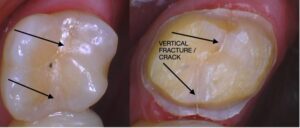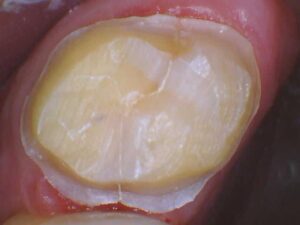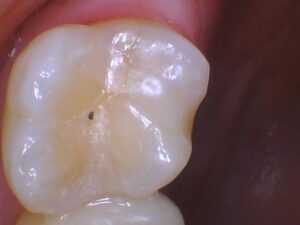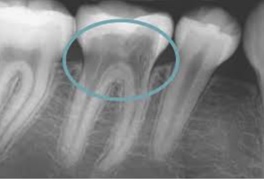March 22nd, 2021

Cracked teeth can be difficult to diagnose. Many of our teeth have hair-line fractures and can be fine for years, but one hard bite, and that can change instantly. This patient was complaining of pain on biting pressure when we diagnosed him with Cracked Tooth Syndrome. The tooth was hypersensitive to hot/cold, and any biting pressure. We had an Endodontist evaluate tooth #15, but they determined no root canal was necessary at this point. We placed a full coverage, same-day ceramic crown over the tooth, and his pain was resolved. Left untreated, the tooth would have needed a root canal, or worst-case scenario, an extraction if the tooth would have split in half. At Water Tower Dental Care in Chicago, we have the technology to take magnified intra-oral pictures, 3D CT radiographs, trans-illumination, and other diagnostic tools to help find and treat these conditions before they become a bigger problem. If you feel like you may have a cracked tooth, or you have teeth that are sensitive to pressure, give us a call…we can help.


January 16th, 2021
External and internal root resorption is a pathological process, which tends to occur following a range of mechanical or chemical stimuli. For example infection, pressure, trauma, or orthodontic tooth movement. It is predominantly detected by radiography, but in some cases root resorption may be identified by clinical symptoms such as pain, swelling, and mobility of the tooth. Treatment alternatives are case‐dependent and aim to address the cause of the resorption and aid the regeneration of the resorptive lesion. Sometimes root canal therapy and alleviate the condition, but many times, extraction and periodic evaluation are needed. There is still many unanswered questions about why root resorption occurs, but many doctors, specialist, and researchers agree it is an auto-immune condition.

At Water Tower Dental Care in Chicago, we use either 2D or 3D imaging to help identify and track these lesions. If you have concerns about root resorption (external, internal, to blunted) root, please give us a call for a consultation. Here is a short video of a patient that had symptomatic root resorption and elected to have the tooth extracted, along with the contralateral tooth due to mobility. Our Periodontist removed the two lateral incisors, placed Nobel Biocare Dental Implants and we restored the teeth with e.Max Crowns cemented on Zirconia Abutments. The lab work was completed by Josh Walker @UtahValleyDentalLab, and the dentistry by Dr. Daniel Aneszko @WaterTowerDentalCare.










 Website Powered by Sesame 24-7™
Website Powered by Sesame 24-7™